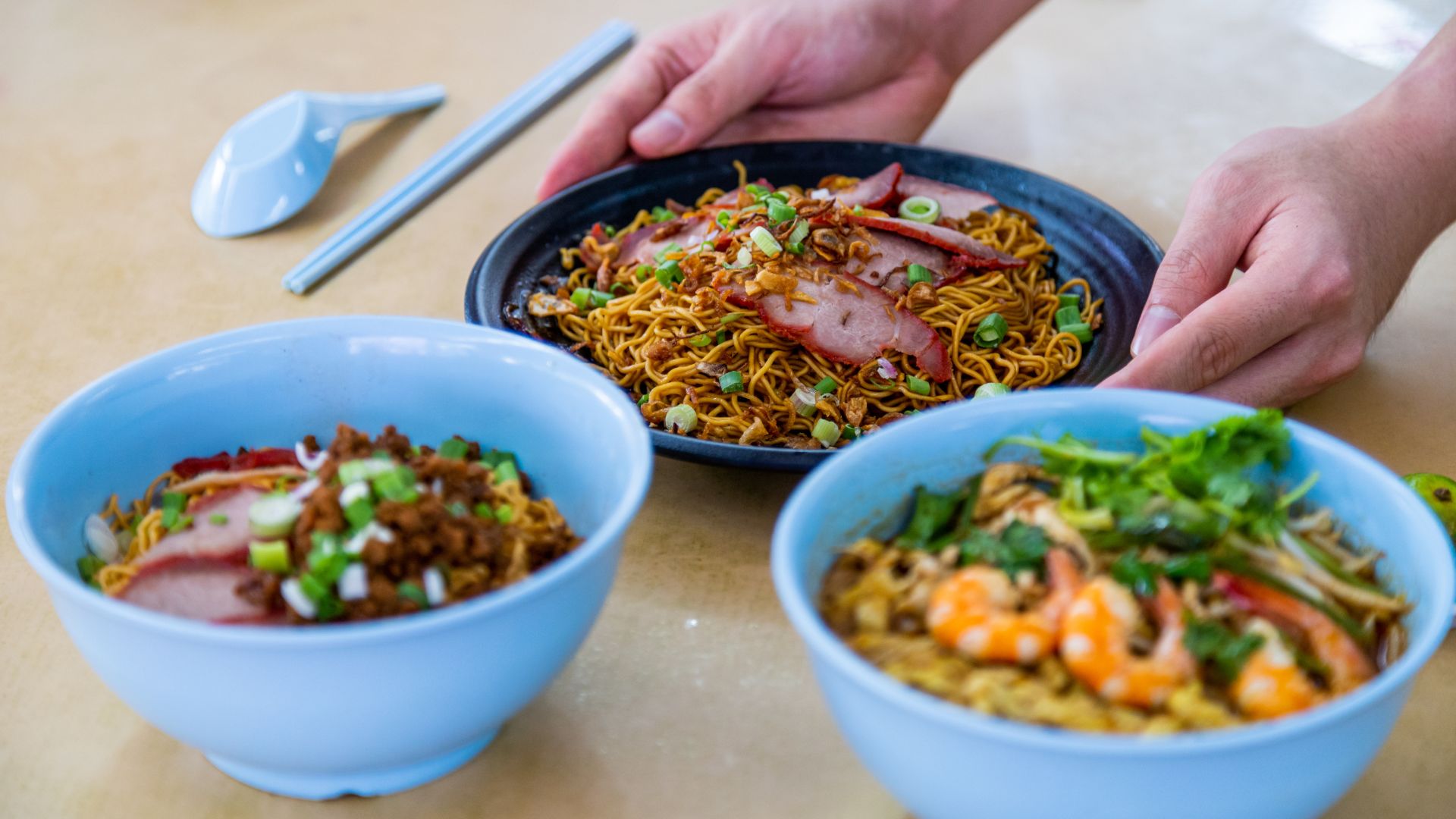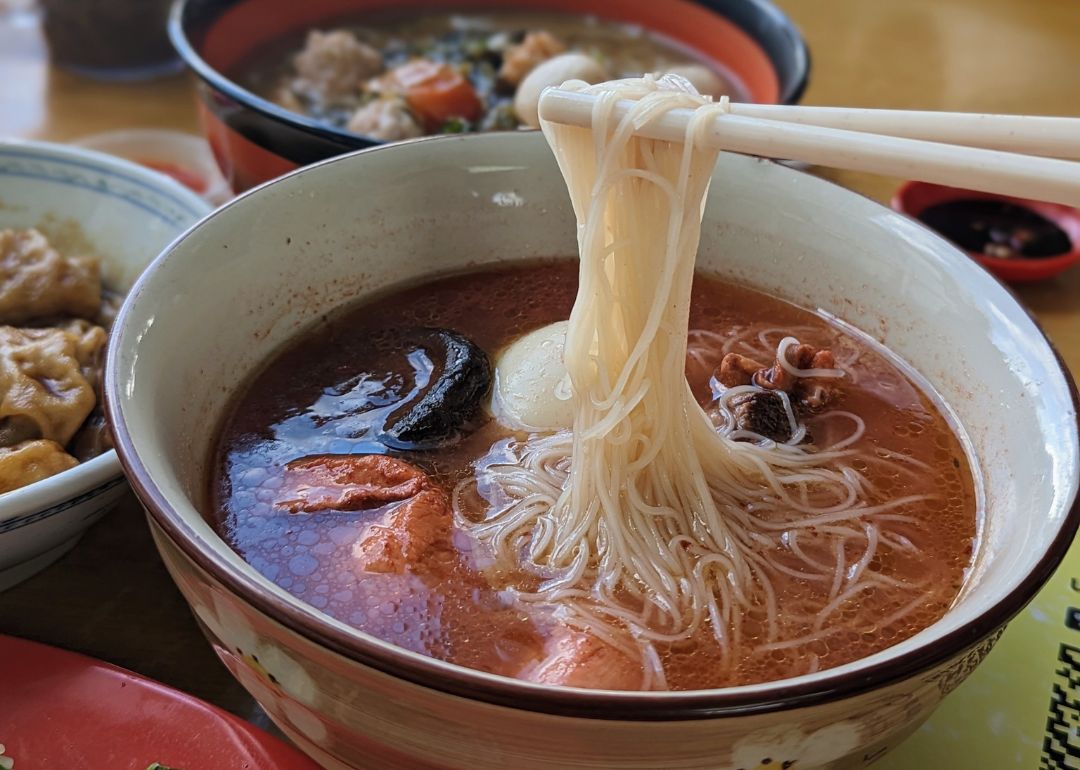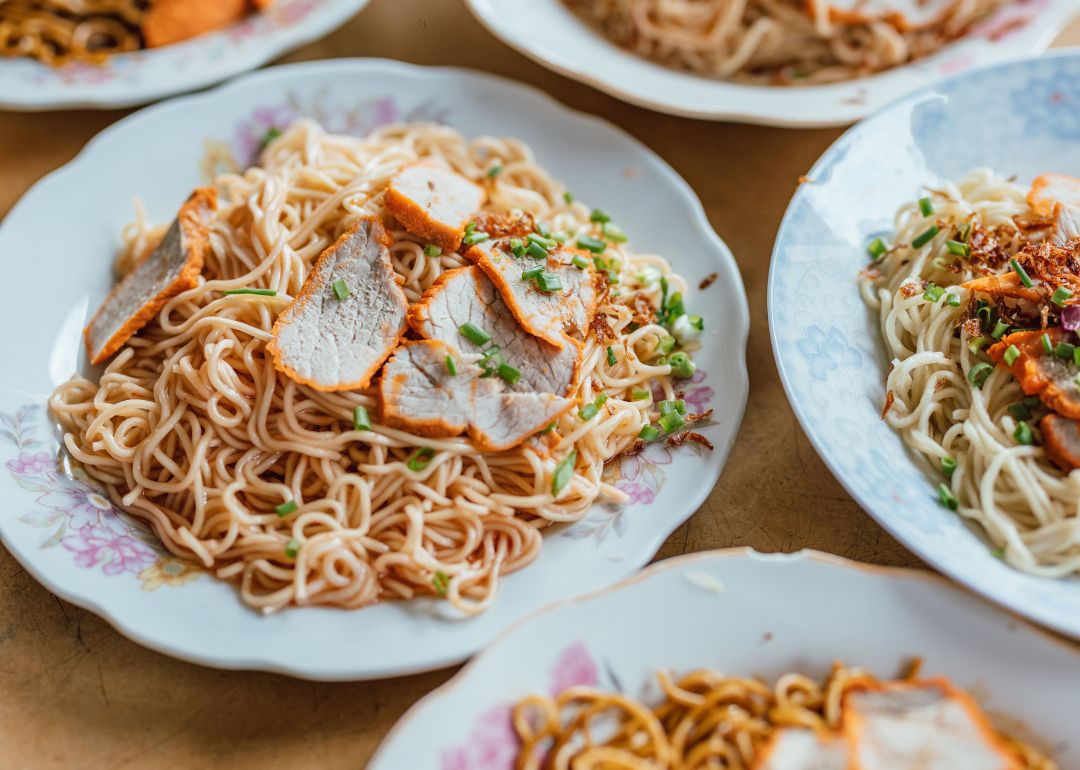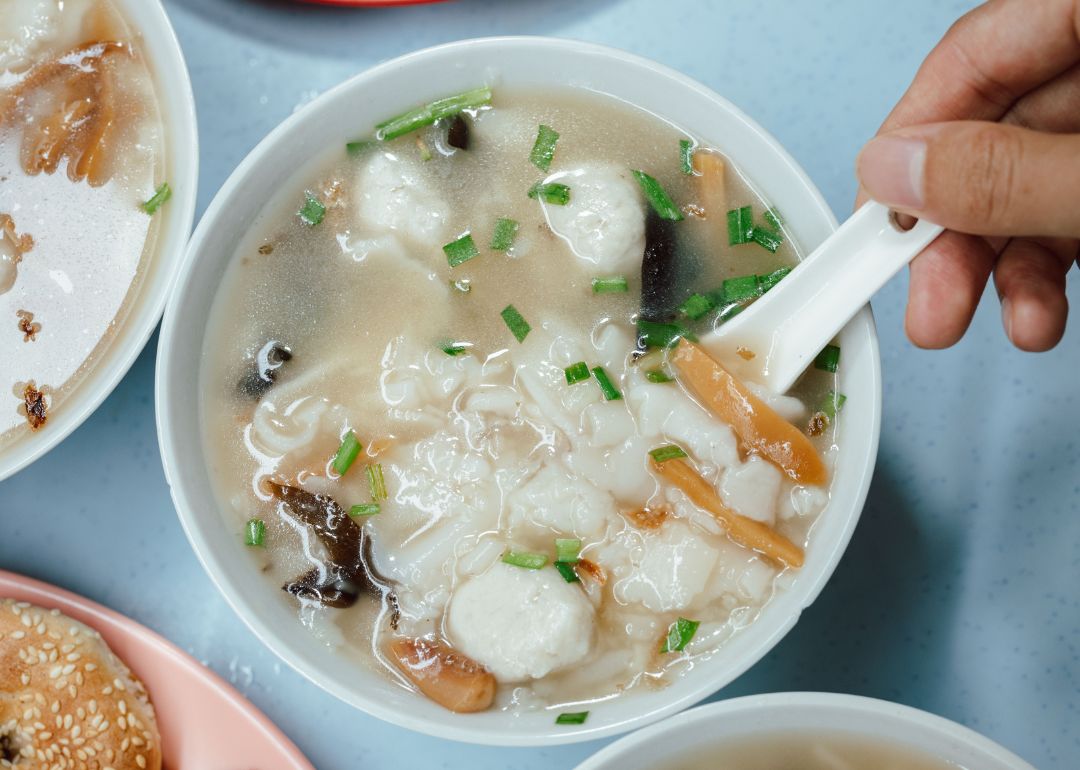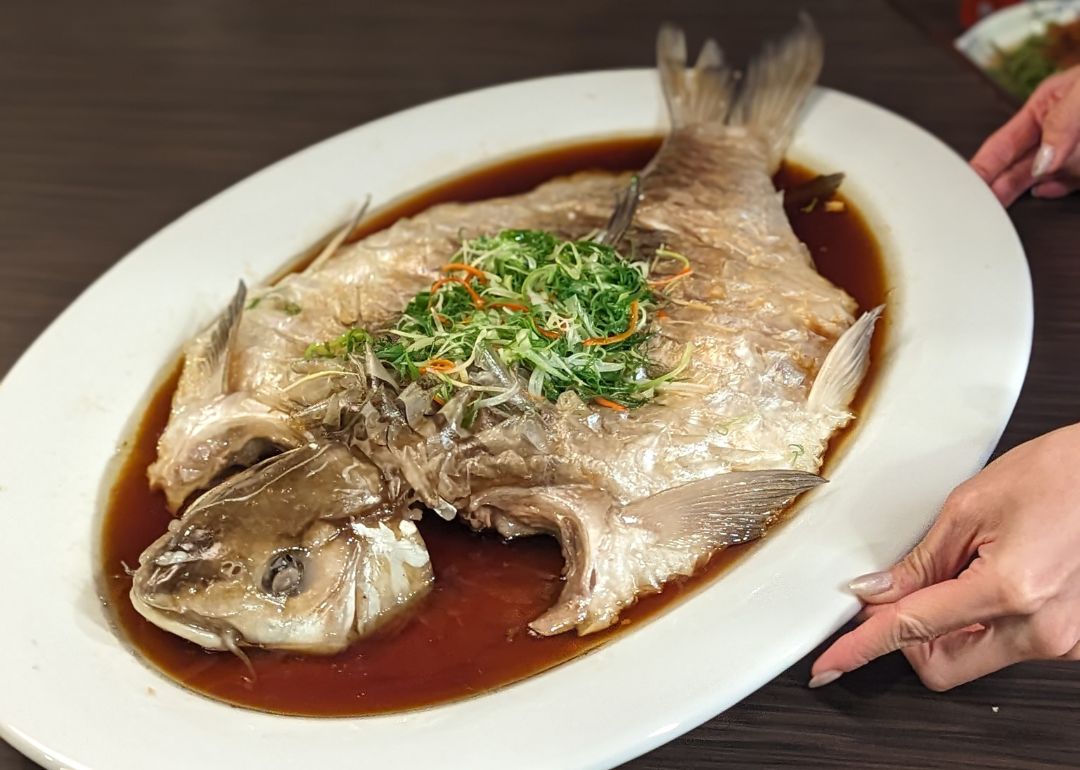If you are a foodie hungry for an epicurean adventure and a taste of history, you’ve got to make a visit to Sibu, a city in Sarawak, Malaysia.
A historic trading post, Sibu invites tourists to savour its array of traditional dishes, and you can discover a treasure trove of handcrafted souvenirs here as well.
Located at the confluence of the Rajang and Igan rivers, Sibu was primarily populated by indigenous tribes like the Iban and Melanau. Officially founded in 1862, Sibu’s teeming agricultural, oil palm and timber industries attracted thousands of Malay and Chinese settlers during the late 19th century.
If you are considering a visit to Sibu, direct flights from Singapore Changi Airport are scheduled to be launched by Scoot in June 2024 with its new Embraer jets. Alternatively, there are connecting flights to Sibu, or you could go on a road trip from Kuching, which is approximately a four-hour drive from Sibu.
Once you’re in Sibu, you can explore the area and discover its rich history and culture, and uncover its vibrant food scene by treating yourself to the following eclectic and flavourful Sibu delicacies.
1. Red Wine Mee Sua
Most Southern Chinese around the world are familiar with mee sua, a long noodle dish that is served at important occasions. To the Chinese, specifically those descended from Foochow (or Fuzhou) immigrants, these long noodles symbolise longevity and are commonly eaten during birthdays.
In Sibu, mee sua is cooked with ginger and sesame oil in a red wine soup. Its red colour symbolises good fortune to the Chinese.
The red wine element of the dish is made by fermenting white glutinous rice that has been mixed with Chinese wine yeast. Red Wine Mee Sua is regarded to be beneficial to one’s health because it is rich in antioxidants and other essential minerals.
Eaten on birthdays, weddings and traditional festivals, Red Wine Mee Sua is often served with stir-fried chicken or boiled eggs.
You can also buy packets of hand-pulled mee sua to bring home—look out for packets of the handmade Master Ting’s Mee Sua, which are easy to cook, made without preservatives, and can be purchased across SIbu and Sarawak.
Try it at: Shi Jia Restaurant
Address: 16 Jalan Pahlawan, Pekan Sibu
Opening hours: 8am to 8pm daily
2. Kampua Noodles
It might look like Wonton or Kolo noodles, but Kampua noodles are more chewy and straighter, and garnished differently. While Wonton noodles are synonymous with the Cantonese, and Kolo noodles with the Kuchingites, Kampua noodles remain a flagship dish of Sarawakians.
Its noodle dough is made from flour, eggs, salt and water, and the noodle is poached and drained before tossed in shallot oil and soy sauce - these condiments are kept light and simple, so that the flavour of the noodles can shine through.
Sibu’s signature noodles are served with roasted pork slices, pork lard, fresh green onions and spicy chilli paste, giving them a memorable aroma and flavour.
The East Malaysian version of these inexpensive noodles has less sauce and garnishing, so that the flavour and texture of the noodles are brought to the fore.
Try it at: Noodle House
Address: No. 2B Ground Floor 1 Lorong Laichee
Opening hours: 8am to 10pm daily
3. Umai
Casually known as Sibu’s rendition of ceviche, Umai is made from locally caught raw fish, lime juice, onions, chillies, vinegar and salt.
The local Melanau fishermen out at sea would add lime juice to their raw catch and eat them fresh to satiate their hunger. While ceviche can feature different types of seafood, Umai usually stars fish species that are native to Sarawak.
Dayak Smoke House Cafe is famous for its Umai, and is also where you can try other Sarawakian specialties like tapioca rice and various renditions of Nasi Goreng.
Just like in ceviche, a dish popular in South American countries, the acid of the lime juice denatures the fish proteins, turning the flesh firm and opaque, as if it has been cooked. Originally a seafarer’s snack, Umai is now served at food stalls across Sibu.
Try it at: Dayak Smoke House Cafe
Address: Lorong Satria 2 Kampung Jeriah
Opening hours: 3pm to 10:30pm daily
4. Kompia
Among Sibu’s most famous pastries is the Kompia, which functions essentially like a Chinese version of a bagel.
The traditional preparation of Kompia involves cooking it in a stone oven, where the dough is slapped on the walls of this tandoor-like oven and cooked from the ambient heat. Topped with sesame seeds, these flat pastries were traditionally served plain and had no fillings.
Later on, Sarawakians began stuffing Kompia with minced pork. Today, you might come across modern variations of Kompia in Sibu that are stuffed with ground peanuts, bean paste, butter or pandan-flavoured custard.
Bakeries, hawker stalls and restaurants across Sibu sell this national pastry, but renowned establishments that have been making Kompia for decades include Tiong Hua Road Kompia. Located within Tiong Hua Road Market, this shop serves freshly made kompia that is crispy on the outside and chewy on the inside.
Try it at: Tiong Hua Road Kompia
Address: Jln Chew Siik Hiong, Pekan Sibu
5. Ding Bian Hu
Created by Sibu’s predominantly Foochow diaspora, Ding Bian Hu translates to “wok side noodles”, as they are literally made along the sides of a wok.
This herbal fish soup is popular among the local indigenous communities, particularly the Iban and Bidayuh people, and often features freshwater fish that is caught from nearby rivers or streams.
Rice flour is kneaded into a dough that is cooked along the sides of a wok, then scraped off into a simmering soup. In the version of this dish only found in Sibu, Sarawakians serve Ding Bian Hu with fishballs, seafood, meat, vegetables and other accompanying ingredients.
Locals sprinkle varying amounts of vinegar and ground white pepper into their Ding Bian Hu for an extra kick and flavour. As you travel across Sarawak, you might encounter different versions of this dish that are flavoured with herbs like ginger, lemongrass, shallots, garlic and turmeric.
Ding Bian Hu is enjoyed as a comforting and nourishing soup on cold days, and regarded as an important pillar of Sibu’s culinary tradition.
Try it at: Chop Hing Huong
Address: 2-40 Jalan Tukang Besi Pekan Sibu
Opening hours: Monday to Saturday, 6am to 2:30pm
6. Midin
For a literal taste of Sibu, check out this viridescent fern that is endemic to the region.
Midin is a delicious vegetable that grows abundantly across Sarawak, and Sarawakian chefs simply forage them from their backyards.
Chefs commonly stir fry the ferns with a belacan (fermented shrimp paste) . And in some eateries, Midin is cooked with Foochow red wine.
Midin maintains its fresh and crisp texture even after stir frying, making it a popular dish at many eateries. It’s gained a bit of international fame as of late, so Sarawakians have been exporting Midin in larger quantities recently. You can even find Midin listed for purchase on popular e-commerce marketplaces.
Try it at: Mak Borneo Sibu
Address: 4-D, Lot 1852, S/L 42, No.21,TGKT Bawah, LRG, Jalan Dr. Wong Soon Kai
Opening hours: Monday to Friday, 11am to 3 pm and 4pm to 11 pm; Saturday to Sunday, 4pm to 11pm
7. Mani Cai
Besides Midin, another popular local produce is Mani Cai, a leafy vegetable available at many restaurants across Sibu.
Rich in vitamins and minerals, this plant called sauropus androgynus is also known as “tropical asparagus”, and in Malay as cangkuk manis or sayur manis.
Sweet and chewy, Mani Cai is similar to spinach and is used as a spinach substitute in many instances — it’s added to noodles like pan mee, also known as ban mian, and stir-fried Mani Cai with eggs and anchovies is a dinner staple that is popular among locals.
In fact, Mani Cai is originally bitter, but is squeezed by hand to remove most of its bitter juice before cooking.
Try it at: Mei Le Cafe
Address: No.92, G/F, Jalan Pedada, Pusat Pedada
Opening hours: 9am to 2pm, 5pm to 9:30pm daily
8. Foochow Fishballs
Another local specialty that Sibu’s Foochow community hold near and dear is Foochow Fishballs.
These springy fishballs are made from freshwater fish like carp or snakehead fish. Traditionally, the fish meat was beaten and thrown by hand using wooden apparatus to achieve a sticky, finely ground paste.
This fish paste is mixed with various seasonings like salt, sugar, and sometimes a bit of starch to improve texture. Unlike other types of fishballs, Foochow Fishballs are stuffed with minced meat, giving diners a surprise as they bite into the fishballs. Trying the fishballs made in Sibu provides a layer of authenticity you won’t be able to get anywhere else.
These balls are then boiled or fried to achieve a turgid consistency, then served in a soup, with noodles, or used as a hotpot ingredient.
Try it at: Fish Culture Cafe
Address: 28 Lorong 3A, Jalan Wong King Huo
Opening hours: 7am to 9:30pm daily
9. Empurau Fish
This Rajang River fish is one of the most famous delicacies of Sibu.
Empurau Fish dishes comes with a hefty price tag (from RM800 to RM1,000 or more, per kilogram), because of its tender and juicy flesh.
Diners also rave about its melt-in-your-mouth texture, making it a must-try for foodies and seafood lovers when they are in Sibu.
This fish that resides upstream along the Rajang River is also known as wang bu liao yu, which is Mandarin for “unforgettable fish”, because of its exceptional quality that leaves diners in awe.
The Empurau fish flock to parts of the river where fruit trees grow, as these fish like feasting on the fallen fruits from the trees. Locals reckon that the sugars of the fallen fruit contribute to the subtle sweetness and creaminess of the Empurau Fish’s flesh.
Interestingly, it is cooked with its scales intact, providing a textural contrast to the soft flesh beneath it. Empurau fish is shared at communal dinners, alongside local favourites like stir-fried Mani Cai and eggs, and Red Wine Mee Sua.
Try it at: Hock Chu Leu Restaurant
Address: Jalan Aman, Pekan Sibu
Opening hours: 8am to 9pm daily
10. Sarawak Laksa
Laksa is a ubiquitous Southeast Asian dish — a curry noodle dish with many variations in the region.
It typically features noodles in a rich and spicy broth cooked with herbs and a spicy chilli paste.
Sarawak Laksa is slightly different from the Singapore laksa or even Penang laksa that many might be familiar with.
The Sarawak version includes shredded omelette, spices and tamarind, with lime on the side. The subtle tang of the tamarind and lime is what makes Sarawak Laksa special and unique.
The late Anthony Bourdain once called Sarawak Laksa the "breakfast of gods", so you ought to try it out for yourself!
Try it at: Aloha Corner
Address: Jalan Keranji, Pekan Sibu
Opening hours: 6am to 5pm daily
With such a wide variety of delicious dishes, now you know why Sibu is featured in our travel bucket list. Sibu has many other famous local dishes like Sibu Dumplings and Sago Worms that you should definitely try if you come across them in a menu. If you need help planning your getaway to Sibu, we’ve compiled an itinerary that will hopefully inspire you!
This story is brought to you by Sarawak Trade and Tourism Office Singapore.
For more updates on Changi Airport, follow on Facebook, Tiktok, Instagram, X, Telegram and YouTube. You can also sign up for a Changi Account and have the latest news and articles delivered right into your inbox.



